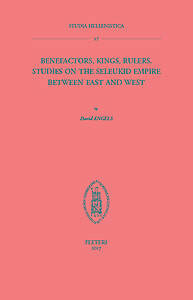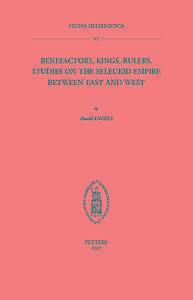
Je cadeautjes zeker op tijd in huis hebben voor de feestdagen? Kom langs in onze winkels en vind het perfecte geschenk!
- Afhalen na 1 uur in een winkel met voorraad
- Gratis thuislevering in België vanaf € 30
- Ruim aanbod met 7 miljoen producten
Je cadeautjes zeker op tijd in huis hebben voor de feestdagen? Kom langs in onze winkels en vind het perfecte geschenk!
- Afhalen na 1 uur in een winkel met voorraad
- Gratis thuislevering in België vanaf € 30
- Ruim aanbod met 7 miljoen producten
Zoeken
€ 234,45
+ 468 punten
Omschrijving
The present volume unites a series of critical studies devoted to the political, institutional and ideological construction of the Seleukid empire, with particular focus on the complex interplay between the Seleukids' Greco-Macedonian background and their Achaimenid heritage. In order to explore whether, and the extent to which, the Seleukids can be considered heirs to the Achaimenids and precursors of the Parthians, and to what extent they simply 'imported' cultural and political behavioural patterns developed in Greece and Macedonia, the studies united here adopt a decidedly interdisciplinary and diachronic approach. They investigate diverse fields, including the construction of the Seleukid royal court; the title of 'Great King'; the prosopography of early Seleukid Iran; the integration of the 'Upper Satrapies' into the new Seleukid empire; the continued importance of the Iranian religions under the early Seleukids; the reign of the Persian Frataraka; the 'feudalisation' of the Seleukid empire under Antiochos III; the construction of a Hellenistic gymnasion in Seleukid Jerusalem; the importance of the Seleukid kingdom as model for Eunous' Sicilian slave-state; the evolution of the Syrian civic elite; and the potential influence of Seleukos' royal propaganda on the religious self-legitimation of Augustus. Finally a general comparison is proposed between the Seleukid empire and 19th century European colonialism.
Specificaties
Betrokkenen
- Auteur(s):
- Uitgeverij:
Inhoud
- Aantal bladzijden:
- 617
- Taal:
- Engels
- Reeks:
- Reeksnummer:
- nr. 57
Eigenschappen
- Productcode (EAN):
- 9789042933279
- Verschijningsdatum:
- 3/07/2017
- Uitvoering:
- Paperback
- Formaat:
- Trade paperback (VS)
- Afmetingen:
- 155 mm x 239 mm
- Gewicht:
- 929 g

Alleen bij Standaard Boekhandel
+ 468 punten op je klantenkaart van Standaard Boekhandel
Beoordelingen
We publiceren alleen reviews die voldoen aan de voorwaarden voor reviews. Bekijk onze voorwaarden voor reviews.









